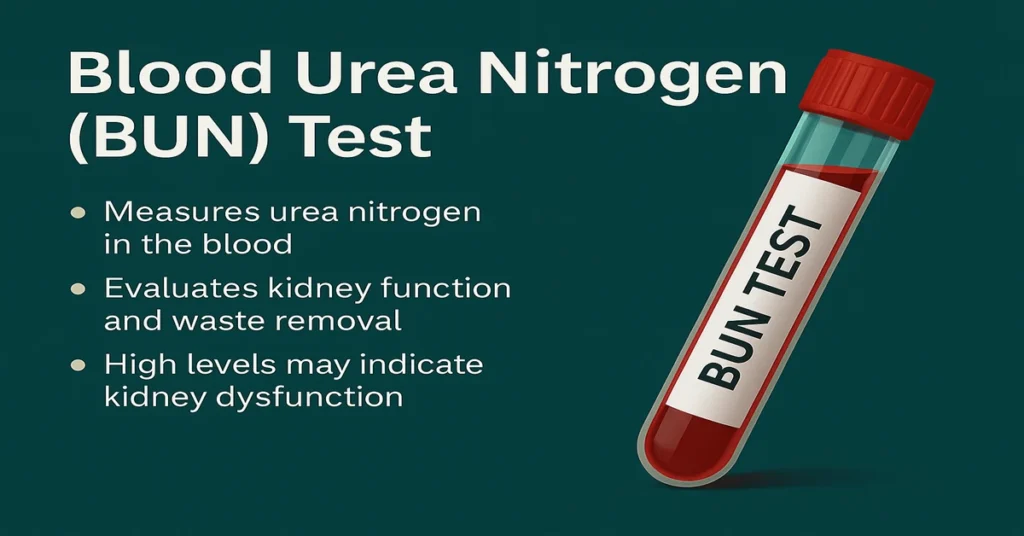What is BUN?
BUN (Blood Urea Nitrogen) is a common blood test that measures the level of urea nitrogen in your blood.
Urea is a waste product formed when the body breaks down proteins from the food you eat. The liver processes protein, converts nitrogen into urea, and releases it into the blood. From there, the kidneys filter it out and remove it through urine.
Since BUN reflects how well your liver produces urea and how efficiently your kidneys filter it, the test is widely used to check kidney health, liver function, hydration levels, and overall metabolic balance.
Where is BUN Produced in the Body?
- Liver: Urea (measured as BUN) is produced in the liver during the urea cycle, a process that removes excess nitrogen from the body.
- Bloodstream transport: The urea enters the blood and travels to the kidneys.
- Kidneys: Kidneys filter the urea and excrete it in urine.
Thus, BUN levels reflect the balance between liver function (production) and kidney function (removal).
Main Functions and Importance
BUN itself has no direct role in the body — it is only a waste product.
However, its measurement is important because:
- It is a marker of kidney health (how well kidneys filter blood).
- It helps detect liver problems (low urea production).
- It can reflect hydration status (dehydration raises BUN).
- It helps monitor people with chronic kidney disease, diabetes, or heart failure.
Causes of Low BUN Levels
Low BUN is less common but may be seen in conditions that reduce urea production or dilute the blood.
- Liver failure (liver cannot produce enough urea)
- Malnutrition or low protein intake
- Overhydration (too much water dilutes BUN)
- Pregnancy (increased blood volume lowers concentration)
- Severe muscle injury
- SIADH (Syndrome of Inappropriate ADH Secretion) – a hormonal condition that causes water retention
Symptoms of Low BUN Levels
Low BUN usually has no symptoms. But if caused by severe liver disease, symptoms may include:
- Fatigue and weakness
- Jaundice (yellowing of skin and eyes)
- Abdominal swelling (ascites)
- Confusion or disorientation
Causes of High BUN Levels
High BUN (called azotemia) is more common and usually points to kidney problems or dehydration.
- Kidney disease or kidney failure
- Dehydration (less water → concentrated urea)
- High protein diet
- Heart failure (reduced blood flow to kidneys)
- Urinary tract obstruction (kidney stones, enlarged prostate)
- Gastrointestinal bleeding (digested blood increases protein load)
- Shock or severe infection
- Medications (e.g., diuretics, antibiotics, corticosteroids)
Symptoms of High BUN Levels
Mildly elevated BUN may not cause symptoms.
When due to kidney failure or severe conditions, symptoms can include:
- Nausea and vomiting
- Metallic taste in the mouth
- Fatigue and weakness
- Swelling in legs or feet (edema)
- Reduced or absent urination
- Confusion or dizziness
- Breath with a smell of ammonia
Reference Ranges (Normal Values)
| Age Group | Normal BUN Range |
|---|---|
| Adults | 7 – 20 mg/dL |
| Children | 5 – 18 mg/dL |
| Elderly | May be slightly higher due to aging kidneys |
Ranges may vary slightly depending on the laboratory. Always interpret results with a doctor.
Sample Type
Sample Type: Serum
Tube Used: Red Top (Plain Tube)
Fasting Required: Usually not required, unless part of a full kidney panel
Test Preparation
To ensure accurate BUN results:
- Drink water as normal (avoid dehydration or overhydration before test).
- Inform your doctor about medications such as diuretics or antibiotics.
- Fasting is usually not needed unless combined with other tests.
- Follow any special instructions from your doctor.
When to Consult a Doctor
You should consult your doctor if:
- Your BUN is above 20 mg/dL (especially with kidney symptoms).
- Your BUN is below normal and you have liver disease symptoms.
- You experience swelling, reduced urination, confusion, or persistent fatigue.
- You have chronic conditions like diabetes, hypertension, or heart disease.
Important Word Explanations
| Term | Meaning |
|---|---|
| Urea | A waste product formed from protein breakdown, removed by kidneys. |
| Azotemia | High levels of nitrogen waste (like urea) in the blood. |
| SIADH | A hormone disorder causing the body to retain too much water. |
| Ascites | Fluid buildup in the abdomen, often due to liver disease. |
| Creatinine | Another kidney function test often done with BUN for better accuracy. |
~END~

